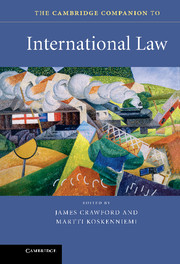Book contents
- Frontmatter
- Contents
- Preface
- Notes on contributors
- Introduction
- Part I The contexts of international law
- 1 International law in diplomatic history
- 2 International law in the world of ideas
- 3 International law as law
- Part II International law and the state
- Part III Techniques and arenas
- Part IV Projects of international law
- Guide to electronic sources of international law
- International law chronology
- Select guide to further reading
- Index
- References
3 - International law as law
from Part I - The contexts of international law
Published online by Cambridge University Press: 05 July 2015
- Frontmatter
- Contents
- Preface
- Notes on contributors
- Introduction
- Part I The contexts of international law
- 1 International law in diplomatic history
- 2 International law in the world of ideas
- 3 International law as law
- Part II International law and the state
- Part III Techniques and arenas
- Part IV Projects of international law
- Guide to electronic sources of international law
- International law chronology
- Select guide to further reading
- Index
- References
Summary
Introduction
What is the character of international law as a legal system? How different is international law from municipal law? Is this difference significant or is it made into more than is justified? What consequences flow from international law being a distinct legal system in terms of its practice and prospects?
International law as a discipline has exhibited an unusual propensity to ask such questions, perhaps because, historically and politically, this has often seemed less a matter of course than for domestic legal orders. In truth the debate about international law as law covers three distinct though related questions. The first deals with what type of legal system international law is. It is immediately quite clear that international law operates differently from domestic law. But to what extent is it a sui generis legal system? Second is the rather more ominous question of whether, on the basis of its defining characteristics, international law can even qualify as ‘law’ properly so called. Confronted with widely publicised and spectacular violations of international law, popular opinion is often tempted to give up on the idea, yet international law is routinely treated as law by its practitioners. Why this disjunction? Third, one of the difficulties in determining what sort of law international law is, or whether it is law at all, is that it is a constantly evolving legal system that has seemingly taken many different shapes over time. Is international law so changeable that it lacks the minimum stability a legal order should have, or is it instead remarkably constant over time despite the appearance of constant renewal?
- Type
- Chapter
- Information
- The Cambridge Companion to International Law , pp. 64 - 92Publisher: Cambridge University PressPrint publication year: 2012
References
- 8
- Cited by

